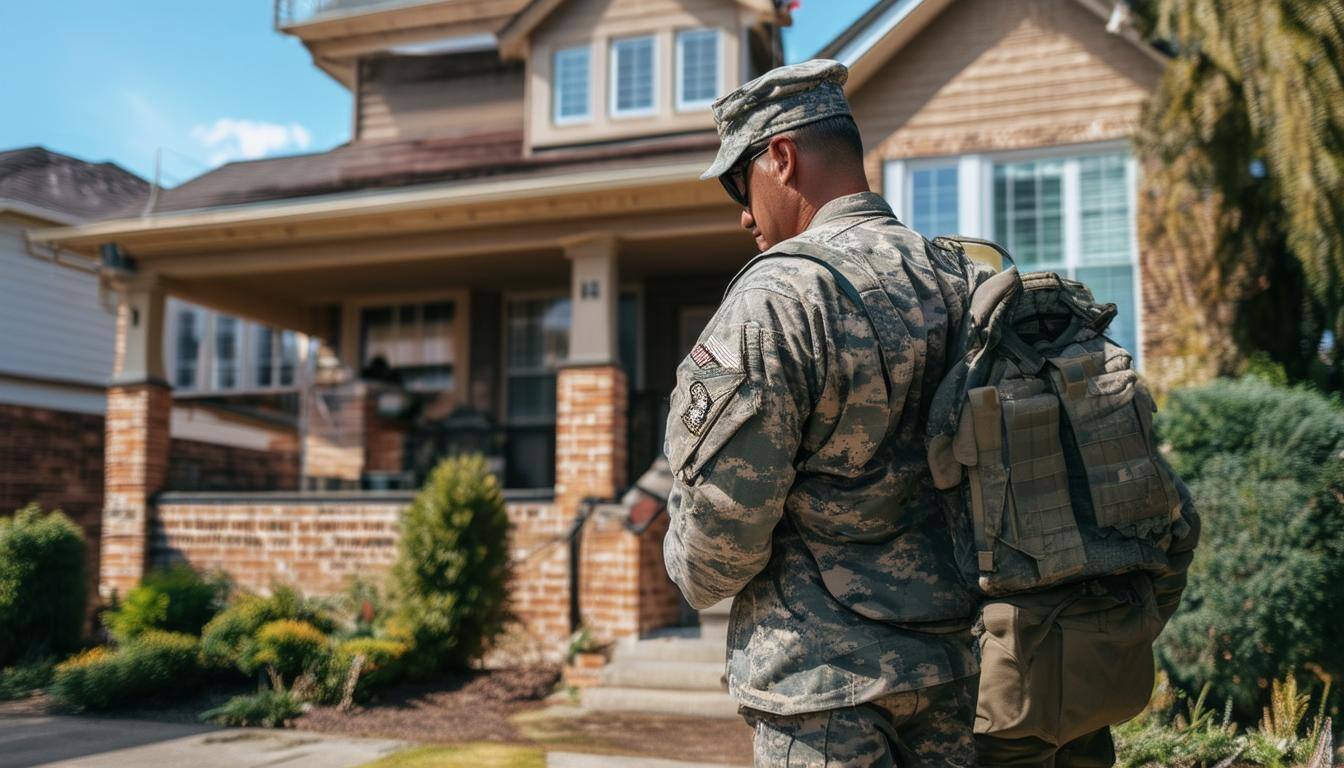9 min read

Did you know that as a veteran or active-duty service member, you could unlock the door to homeownership with a VA loan? These exclusive loans offer incredible benefits, including ultra-low interest rates, minimal down payments, and the elimination of expensive private mortgage insurance, making it easier than ever to secure your dream home. Whether you're buying your first home or refinancing, the VA loan program is designed to support those who have served our country—so why not take full advantage?
But did you know that there's another benefit to this loan? It's ‘assumable’.
This option allows you to assume an already existing VA loan, saving you a lot of dollars. So, if you want a VA assumable loan, let's guide you through this feature so you can make an informed decision and save your hard-earned money!
What is a VA Assumable Loan?
Understanding VA Loan Assumption
The Department of Veterans Affairs offers veterans, active duty officers, and spouses VA loans. However, you don't necessarily have to be in the military to qualify for this loan.
You may wonder how to assume a VA loan and how it works. It's simple. A VA assumable loan is a mortgage that can be transferred from its current borrower to a new borrower. With this transfer, the new buyer takes on all the terms of the original loan, including its interest rate, monthly payments, loan balance, etc., from the previous borrower.
Difference Between Assumable loan and Traditional loan.
The military aspect isn’t the only difference between VA and traditional loans. If you decide between these two, it's better to know how they differ and how they affect you.
While one isn’t superior to another, VA loans have better benefits—if you are eligible. They don't require a downpayment or mortgage insurance. Moreover, VA loans allow more flexibility in determining eligibility than traditional loans.
History of VA Assumable Loans
The VA loan assumption was introduced to assist veterans and give them affordable housing. Over the years, the VA loans have expanded their eligibility criteria and added safeguards so that veterans' benefits are better protected while also allowing other individuals, non-veterans, to qualify for this loan under certain circumstances.
Eligibility Requirements for VA Loan Assumption
Let’s take a closer look at the eligibility requirements for assuming a VA loan:
Who Can Assume a VA Loan?
While being a veteran isn't a necessity for VA assumable loans, there are still specific requirements that you must meet.
- The existing loan should be VA.
- The buyer’s credit score should be a minimum of 620.
- The buyer's debt-to-income ratio should be less than 41%.
- The buyer must agree to take on all existing mortgage obligations from the previous borrower.
- The closing fee of the VA loan must be covered by either the buyer or the seller.
- The processing fee must be by the buyer—upfront.
- The buyer must have sufficient residual income.
- The buyer must pay the funding fee of 0.5% of the loan balance.
- The buyer must have a 12-month history of on-time mortgage payments.
Do You Need to Be a Veteran to Assume a VA Loan?
No, while these loans are reserved for veterans, the VA loan option also extends to civilians under specific conditions. If the buyer meets the requirements, they can assume a VA loan.
Benefits of Assuming a VA Loan
Lower Interest Rates
By assuming a VA loan, you can benefit from a lower interest rate. There’s a good chance it can lower your monthly costs by hundreds of dollars. The current mortgage rate is 7%; depending on the terms, you can get as low as 3%!
No Down Payment Requirement
One of the most prominent benefits of a VA loan is that you can avoid a down payment on your loan. This benefit is transferred with the assumable loan.
Cost Savings in Fees and Closing Costs
Compared to conventional loans, the benefit of a VA loan assumption is that it comes with very few costs. This is because the closing costs associated with the original VA purchase don’t transfer and aren’t part of an assumption.
The VA Loan Assumption Process
Step 1: Check Eligibility
First, check if you meet the VA loan assumption requirements, including credit scores, debt-to-income ratio, and income—Cross-check with your current lender or mortgage servicer.
Step 2: Find a Home
Find an eligible home for sale with an assumable VA loan lender. You can use platforms like Assumable to find properties where VA assumptions loans are permitted.
Step 3: Negotiate terms
After you’ve decided on your home, work with the seller to negotiate the terms of your VA loan, including the purchase price.
Step 4: Lender approval
Apply to secure lender approval. The VA loan lender will then assess your creditworthiness and other financials.
Step 5: Complete transaction
The last step is to close the deal officially by assuming the VA loan and taking ownership of your home. When you get approved, the loan is transferred and you will become the new homeowner!
VA Assumable Loan vs. VA Refinance
When considering a VA loan, it's worth comparing it to VA finance.
Interest Rate Comparison
It can be a better option than refinancing if the interest rate on the existing VA loan is lower than the current market rates.
Closing Costs and Fee Differences
Refinancing typically has higher closing costs and fees, while VA loans have almost no extra costs and expenses.
Release of Liability After a VA Loan Assumption
When transferring your VA loan to the new buyer, they must agree to accept all obligations and liabilities attached to the loan. The seller has two options to be officially released from the loan obligations. The seller can either include a loan assumption statement in the transfer deed or get the buyer to sign a separate legal document. However, just make sure that the VA approves both options.
Pros and Cons of VA Assumable Loans
Like any other loan, there are advantages and disadvantages to assuming a VA loan.
Advantages
There are pros to assuming a VA loan for both buyers and sellers. Below are some of the benefits of VA assumable loans:
- Cost Savings: You can avoid the closing costs, mortgage, closing, and appraisal fees.
- Accessible for Non-Veterans: VA loans can also be assumed by civilians, significantly increasing the pool of potential buyers.
- Lower Interest Rates: If the original loan had low interest rates, then assuming that loan would lead to significant long-term savings.
- Restoration of Loan Benefits: The seller can reclaim the VA loan benefits after the veteran assumes the loan.
Drawbacks
While there are pros, there are cons to assuming a VA loan. Let's see what they are:
- Lender’s Approval: The home-selling process can take a long time because not all lenders approve of a VA loan. Each application must be reviewed individually.
- Risks: If the buyer defaults on the loan, the original borrower will be liable. The lender must formally release the original borrower from all loan obligations.
- Impact on the Seller’s VA entitlement: The seller's VA entitlement remains tied to the original loan until fully repaid.
How to Increase Your Chances of Qualifying for a VA Assumable Loan
Improving Your Credit Score
If your credit score is good, you would have a better chance of assuming a VA loan. So, focus on increasing your credit score to meet the lender's requirements. Doing this includes paying off your debts and fixing the errors on your credit report.
Gathering Required Documentation
Certain documents are needed for the lender to approve your applications. To expedite the loan process, you should have documents like tax returns, proof of income, and employment history on hand.
Understanding Funding Fees and Exemptions
VA loans have funding fees. However, some borrowers are exempt. You’d have to check with your VA loan lender to see if you fit that criteria for exemption.
Exemption Criteria for the Funding Fees
The following are known exemption criteria:
- The buyer is eligible for service-related disability compensation by the VA.
- The buyer receives compensation for pre-discharge liability.
- The buyer is the spouse of a prisoner of war, someone who died in the line of duty or died from service-related actions, or a spouse of someone who went missing in action.
Common Challenges in VA Loan Assumption
Seller Hesitancy or Reluctance
Some sellers do not want to allow loan assumptions because they do not wish to restore entitlements. It can be helpful to explain how the assumption can be advantageous for the two parties involved.
Credit and Income Verification Issues
If you need to comply more with credit or income standards, a financial advisor or credit counselor can help you improve your status.
VA entitlement and Transfer
If the buyer is not a veteran, the seller’s entitlement may stay attached to the loan, restricting the seller’s ability to use another VA loan in the future.
Real-Life Examples of VA Loan Assumptions
Case Study 1: Military Personnel Assuming a VA Loan from a Fellow Veteran
A veteran moving due to military orders chose to take over another veteran's VA loan to get a low 2.5% interest rate with 27 years left on the term. The buyer could save needless fees because the procedure took less than 45 days, and no realtor was involved. Both sides profited from this peer-to-peer assumption: the seller swiftly transferred the loan, while the buyer avoided paying exorbitant mortgage rates.
Case Study 2: Civilian Buyer Assuming a Veteran’s VA Loan
In contrast to current market rates, a civilian buyer took out a VA loan for veterans with an interest rate of 3.25%. After six months, the buyer finished the assumption despite the lender's delays.
FAQs About VA Assumable Loans
What happens to the original borrower’s entitlement?
It depends on whether the new borrower is a veteran or a civilian. If the buyer is a civilian, the original borrower’s entitlement would be tied to the loan, affecting their ability to use a VA loan.
Are there any restrictions on the types of property eligible for a VA loan?
VA loans typically only cover residential homes, not investment properties or vacation houses.
Can a VA loan be assumed more than once?
Yes, but you must qualify for all the requirements, and the lender must approve the application.
What Happens to VA Loan Liability in the Case of Divorce?
VA loan assumptions come into play when the homeowners are divorcing. If both partners were jointly liable for the loan, then one spouse could release the liability, allowing the other to become the property’s owner and the one liable for the loan.
Conclusion
VA assumable loans offer a favorable mortgage option to veterans and non-veterans alike. By assuming a VA loan, buyers can get a loan with lower interest rates, no down payment, and low to no fees.
Ready to take the next step toward acquiring your dream home? Contact a VA-approved lender and get started today!
Table of Content

Take your pick of loans
Experience a clear, stress-free loan process with personalized service and expert guidance.
Get a quote
.png?width=352&name=xxxxxx%20header%20(58).png)

